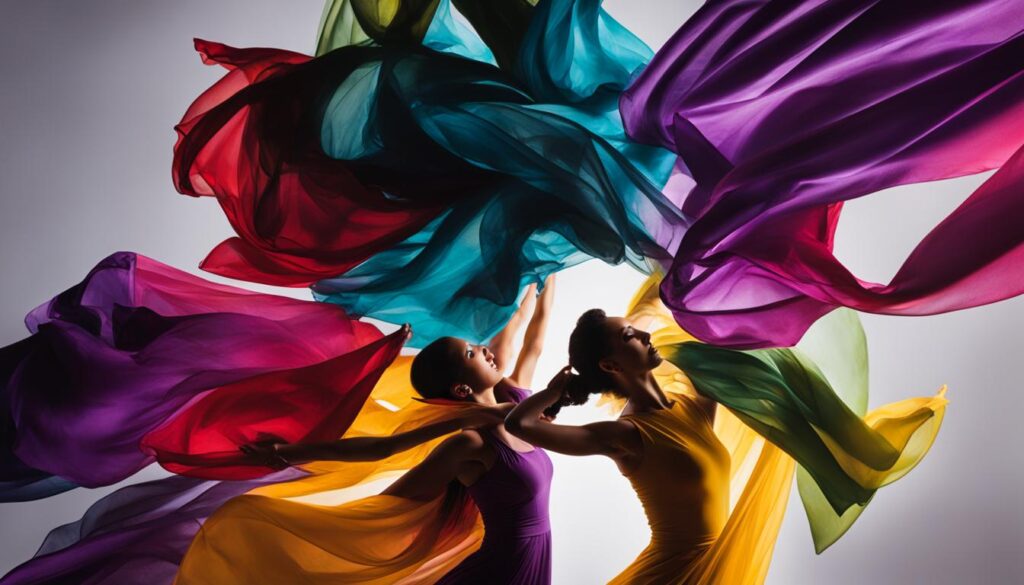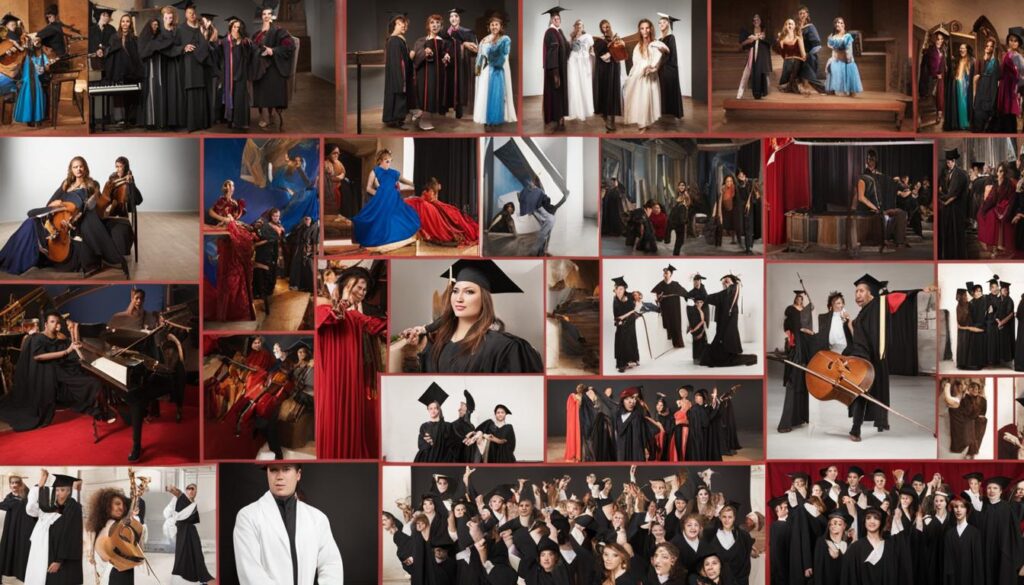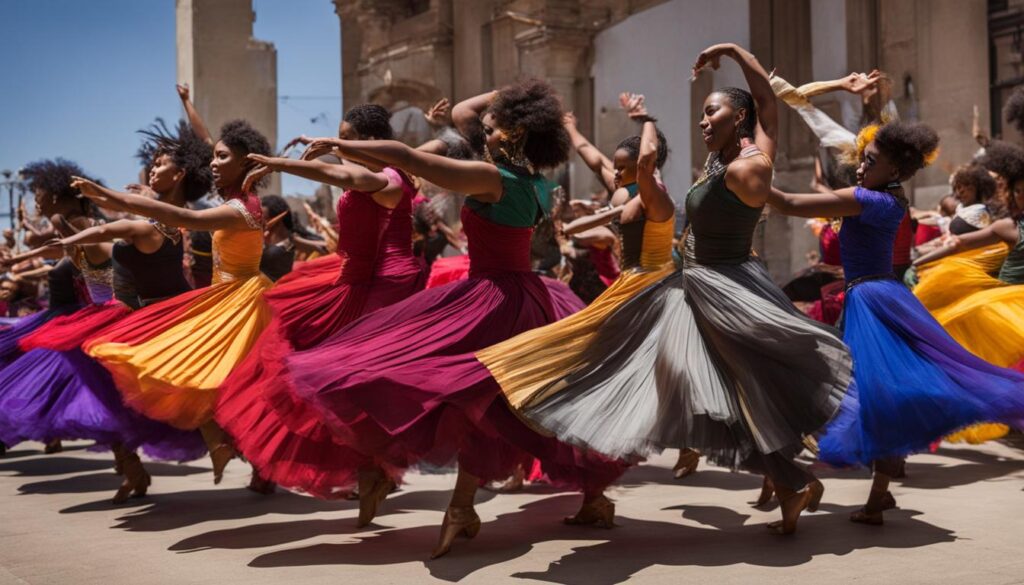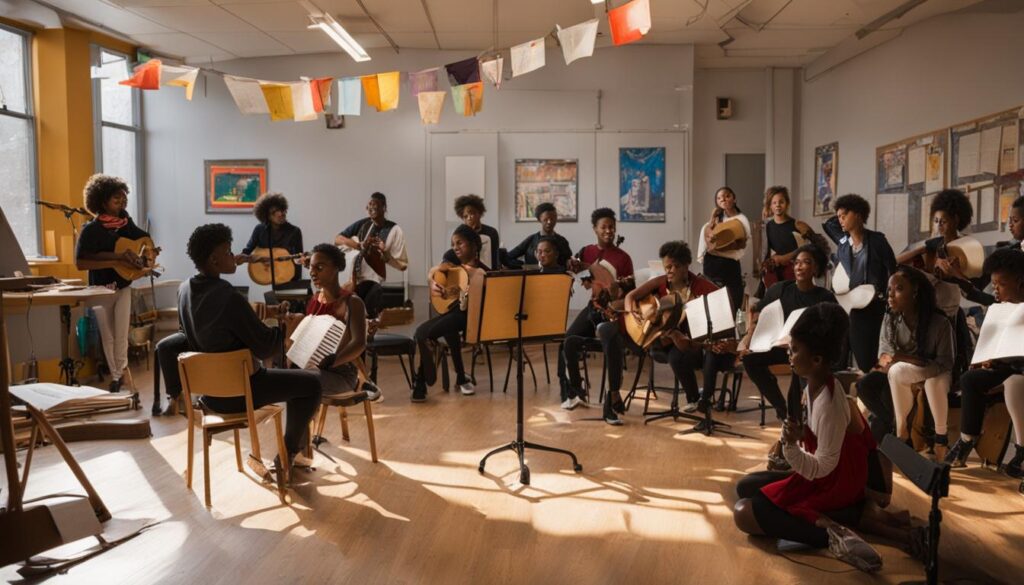A performing arts degree, also known as a degree in visual and performing arts, is a specialized and practical form of education that prepares students for careers in acting, stage performance, music, and dance. With an interdisciplinary approach, these degrees offer a comprehensive foundation in the performing arts and allow students to explore various disciplines like art history, communication studies, dance, theatre, film, music, photo-video-digital arts, or interdisciplinary arts.
Performing arts degrees provide students with the skills necessary to pursue a wide range of career opportunities in fields such as art history, interior design, curation, copywriting, production, photography, and information specialization. By incorporating written and oral communication skills, creativity, independence, and cultural understanding, these degrees equip graduates with the tools they need to succeed in the industry.
So, if you’re passionate about the performing arts and want to develop your artistic abilities while gaining valuable interdisciplinary education, a performing arts degree may be the perfect choice for you.
Key Takeaways:
- A performing arts degree prepares students for careers in acting, stage performance, music, and dance.
- These degrees offer an interdisciplinary study of the arts, allowing students to explore various disciplines within the field.
- Graduates of performing arts degrees have a wide range of career options available to them, including art history, interior design, curation, copywriting, production, photography, and information specialization.
- Performing arts degrees provide students with valuable skills in communication, creativity, and cultural understanding.
- Choosing a performing arts degree allows students to develop their artistic abilities and gain real-world experience through participation in student organizations and performances.
Types of Performing Arts Degrees
When it comes to pursuing a performing arts education, there are various types of degrees available for students to choose from. These degrees provide a comprehensive foundation in the arts and offer concentrations in specific disciplines within the field.
Bachelor of Arts (BA) in Visual and Performing Arts
One common type of performing arts degree is the Bachelor of Arts (BA) in Visual and Performing Arts. This degree program allows students to explore different disciplines, such as art history, communication studies, dance, film, interdisciplinary arts, music, photo-video-digital arts, theatre, or visual arts. By specializing in a particular area, students can develop a deep understanding of their chosen discipline and hone their skills.
Performing Arts Degree Programs
Performing arts degree programs are offered by dedicated performing arts schools, colleges, and universities. These programs provide students with a comprehensive education in their chosen discipline and expose them to various aspects of the performing arts industry. Students can expect to engage in practical coursework, collaborate with fellow students, and gain real-world experience through performances and productions.
Performing Arts Colleges and Universities
Performing arts colleges and universities are institutions that offer specialized programs in the field of performing arts. These institutions have faculty members who are experts in their respective disciplines and provide mentorship and guidance to students. By attending a performing arts college or university, students can immerse themselves in a dynamic and creative environment that fosters their artistic growth and development.
| Type of Degree | Specializations | Institutions |
|---|---|---|
| Bachelor of Arts (BA) in Visual and Performing Arts | Art History, Communication Studies, Dance, Film, Interdisciplinary Arts, Music, Photo-Video-Digital Arts, Theatre, Visual Arts | Colleges and Universities |
| Performing Arts Degree Programs | Various disciplines within the performing arts | Performing Arts Schools, Colleges, and Universities |
| Performing Arts Colleges and Universities | Specialized programs in the performing arts | Performing Arts Colleges and Universities |


By pursuing a performing arts degree, students have the opportunity to dive deep into their chosen discipline and gain the necessary skills and knowledge for a successful career in the performing arts industry. Whether it’s through a Bachelor of Arts program or a specialized degree at a performing arts college or university, students can develop their creativity, hone their craft, and prepare themselves for the diverse and exciting world of performing arts.
Career Options with a Performing Arts Degree
Having a performing arts degree opens up a wide range of career opportunities for graduates. The skills and knowledge gained throughout their education provide a strong foundation for success in various fields. Here are some of the exciting career paths that individuals with a performing arts degree can pursue:
- Art Historian: With a deep understanding of art and its history, art historians play a vital role in preserving and interpreting artistic works. They conduct research, curate exhibitions, and contribute to the field’s scholarly discourse.
- Interior Designer: The creative and spatial skills acquired through a performing arts degree can be applied to the world of interior design. Graduates can create aesthetically pleasing and functional spaces that enhance people’s lives.
- Curator: Curators are responsible for selecting and organizing exhibitions in museums, galleries, and cultural institutions. They play a crucial role in showcasing the work of artists and shaping the narrative of the art world.
- Copywriter: The ability to communicate effectively is a valuable skill gained through a performing arts degree. Copywriters use their creativity and language proficiency to craft compelling and persuasive content for advertising, marketing, and other media.
- Producer: Producers oversee the creation and execution of artistic projects, whether it’s a play, film, or music production. They coordinate all aspects of the production process, including financing, casting, and marketing.
- Photographer: Visual storytelling is at the core of both performing arts and photography. Graduates can apply their artistic eye and technical skills to capture compelling images that convey profound messages and emotions.
- Information Specialist: With their research and analytical skills, performing arts graduates can excel as information specialists, helping individuals and organizations access and navigate the vast resources of the arts and cultural sector.
These career options illustrate the versatility and adaptability of a performing arts degree. Graduates can leverage their interdisciplinary education and artistic talents to thrive in a variety of professional settings.


The Importance of Performing Arts Education
Performing arts education plays a crucial role in preparing students for careers in the performing arts industry. By attending performing arts schools, students receive mentorship from knowledgeable coaches and industry professionals who help them identify their goals and guide them towards achieving them. Performing arts degrees offer an immersive and interdisciplinary experience, providing students with a strong foundation in various disciplines within the performing arts.
These degrees expose students to a holistic performing arts experience, allowing them to explore different disciplines and gain a comprehensive understanding of the industry. Performing arts schools provide a dynamic and collaborative environment where students can develop their skills, create meaningful projects, and form lifelong friendships.
Performing arts education not only develops students’ artistic abilities but also equips them with valuable life skills. It fosters creativity, critical thinking, teamwork, and resilience, all of which are essential for success in any career. The collaborative nature of performing arts education encourages students to work together, problem-solve, and communicate effectively, skills that are transferable to various professional settings.
Furthermore, performing arts education offers students opportunities for personal growth and self-expression. Through artistic exploration, students can discover their unique voice and gain confidence in their abilities. This self-discovery process is instrumental in building resilience and developing a strong sense of identity.
| Benefits of Performing Arts Education | Examples |
|---|---|
| Enhanced Creativity | Students develop innovative thinking and problem-solving skills. |
| Effective Communication | Students learn to express themselves verbally and non-verbally. |
| Critical Thinking | Students analyze and interpret artistic works, fostering analytical skills. |
| Collaboration | Students work as a team and learn to value diverse perspectives. |
| Self-Confidence | Students gain confidence through performance and self-expression. |
Conclusion
A performing arts degree, also known as a degree in visual and performing arts, offers students a unique and interdisciplinary education in the arts. These degrees provide concentrations in various disciplines, allowing students to specialize in their area of interest.
Graduates of performing arts degrees have a wide range of career opportunities available to them in fields such as art history, interior design, curation, copywriting, production, photography, and information specialization.
The interdisciplinary nature of performing arts degrees equips students with valuable skills in communication, creativity, and cultural understanding, making them well-prepared for success in the industry. Performing arts education provides students with a holistic and immersive experience, allowing them to explore their passion for the arts and develop their artistic abilities.
FAQ
What is a performing arts degree called?
A performing arts degree is also known as a degree in visual and performing arts.
What types of performing arts degrees are available?
Performing arts degrees come in various types, such as Bachelor of Arts (BA) in Visual and Performing Arts with concentrations in disciplines like art history, communication studies, dance, film, interdisciplinary arts, music, photo-video-digital arts, theatre, or visual arts.
What career options are available with a performing arts degree?
Graduates of performing arts degrees have a wide range of career opportunities available to them, including art historians, interior designers, curators, copywriters, producers, photographers, and information specialists.
Why is performing arts education important?
Performing arts education plays a crucial role in preparing students for careers in the performing arts industry. It provides an immersive and interdisciplinary experience, helping students develop a strong foundation in various disciplines within the performing arts.

